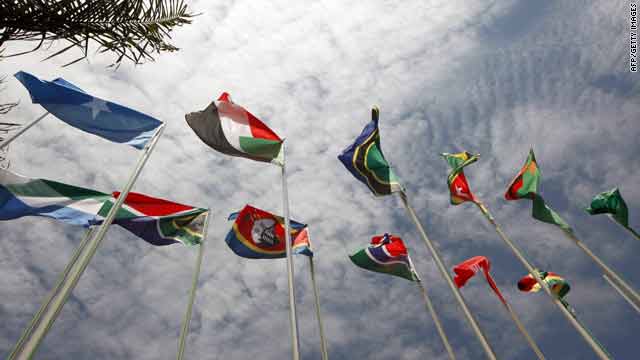Ping: AU peacekeepers in Somalia need help

- The AU Commission president says leaders are disappointed in the U.N. Security Council
- The United Nations maintains it supports African Union peacekeepers in Somalia
- Leaders are hoping to beef up the AU peacekeeping force
- Djibouti and Guinea have forces ready for deployment
Munyonyo, Uganda (CNN) -- The lack of a global response to the Somali crisis has created fertile ground for threats to regional peace in Eastern Africa and the rest of the continent, the president of the African Union Commission said.
African leaders believe Somalia has been largely forgotten by the U.N. Security Council, which is primarily responsible for peacekeeping, Jean Ping said Monday.
The council "had an obligation to send a peacekeeping mission to Somalia to help bring back stability," Ping said. "The international community appears to be only preoccupied with the issue of piracy off Somalia. We are all members of the U.N., and we pay our contributions to the U.N."
However, Yves Sorokobi, spokesman for U.N. Secretary-General Ban Ki-moon, noted the organization has supported the current African Union peacekeeping force currently in Somalia, financially and otherwise, and that the peacekeepers are there under a Security Council resolution.
 Video: More AU troops to Somalia
Video: More AU troops to Somalia
Last year, Ban said that "deployment of a United Nations peacekeeping operation directly, at this stage, would be a high-risk option," according to the U.N. Dispatch website, which says it provides commentary and coverage on U.N.-related issues.
"Given the divergent views among the main Somali political players ... such an operation could trigger opposition from substantial elements of Somali society opposed to international military intervention," the site quoted Ban as saying. "It is highly likely that those opposed to the peace process would portray the mission as a new enemy, which would consequently add momentum to the insurgency and detract from the political process."
Ping said South African President Jacob Zuma has been asked to deploy peacekeeping troops to Somalia in support of the AU peacekeeping effort, known as the African Union Mission in Somalia, or AMISOM. The force is in need of tactical helicopters and other equipment, which Ping said should be provided by the international community.
The African Union summit, which continues through Tuesday, "has agreed to make the AMISOM more robust in terms of equipment and numbers," Ping said. He said he expects the goal of 8,000 troops to be met.
While countries have made pledges of troops, only Djibouti and Guinea have battalions ready for deployment, he said. Additional equipment and resources are required, he said, and peacekeepers' salaries should be raised from their current level, about $500 a month, to the U.N. peacekeeping scale of $1,080.
"AMISOM troops are earning far less than their counterparts in UNAMID -- the peacekeeping mission in Darfur -- because it is a U.N.-funded mission," Ping said.
Somalia is "one of the world's most complicated humanitarian crises," with 40 percent of the population relying on United Nations aid for survival, Mark Bowden, the U.N. envoy to the troubled African nation, told the Security Council last week.
The country's central government is extremely weak and the drought-stricken nation is essentially lawless. What security does exist is provided by militias and rebel groups. Clashes between rebel groups and government forces have been especially fierce since 2009, when the current moderate president came to power.
The Islamist militant group Al-Shabaab earlier this month claimed responsibility for bombings in the Ugandan capital that killed some 74 people, many of whom had gathered to watch the World Cup final. The group said the bombings were in retaliation for Uganda's contribution to the peacekeeping effort.
The mission currently has about 6,000 troops from Uganda and Burundi. They protect government installations, including the airport, the presidential palace and sections of the port, under their current mandate, but the AU is pushing for an expansion.
Ping said ramping up the effort depends on making sure the necessary equipment and funding is in place.
Meanwhile, Ping urged the Security Council to revise an earlier resolution that discourages neighboring nations from contributing peacekeepers to Somalia.
''If the Security Council cannot revise this issue, then let them take the necessary steps to deploy a peacekeeping mission to Somalia,'' Ping said.
CNN's Ashley Hayes and David McKenzie contributed to this report.
